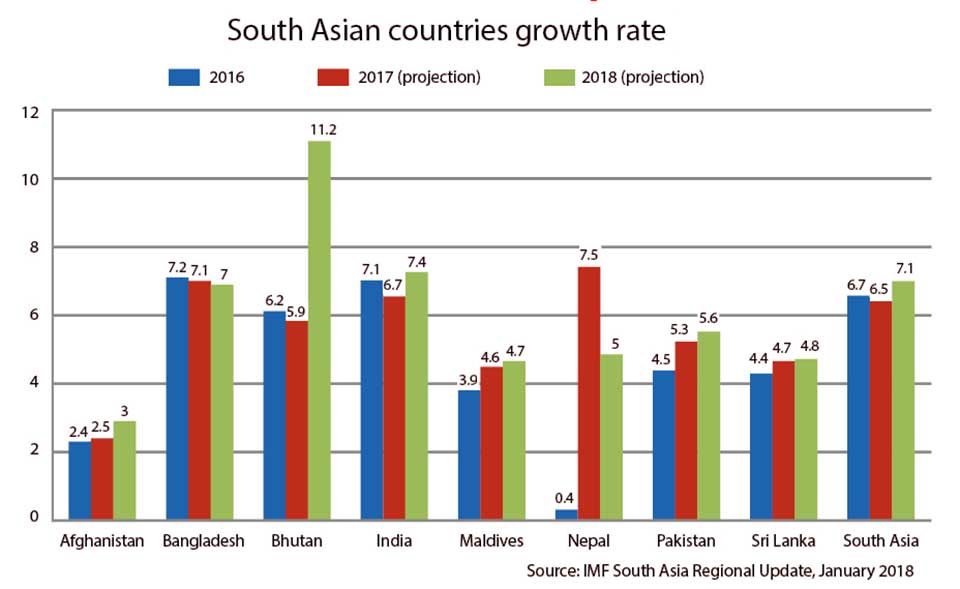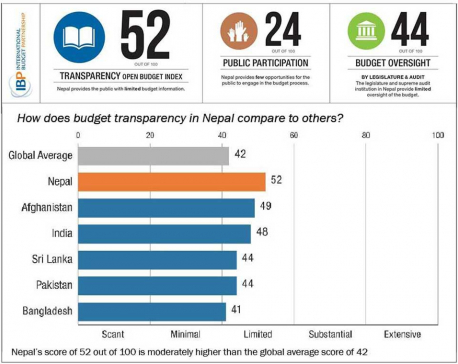
OR
2018 south asia outlook
IMF sees Nepal an exception to South Asian economic growth
Published On: January 21, 2018 08:42 AM NPT By: Sagar Ghimire | @sagarghi

KATHMANDU, Jan 21: The International Monetary Fund (IMF) has said that growth is expected to accelerate or remain broadly stable in South Asia except Nepal.
Releasing the South Asia Regional Update entitled ‘South Asia: The Robust Outlook Continues’ on Friday, the Fund, headquartered in Washington DC, said that Nepal’s growth is projected to moderate at 5 percent in the current Fiscal Year 2017/18, after the real GDP growth climbing up to 7.5 percent in 2016/17.
“The challenge now is to maintain the momentum and avoid falling back to the relatively low average historical growth of about 4 percent per annum through steady implementation of structural reforms,” read the IMF’s South Asia Regional Update.
The rebound in the last fiscal year was supported by a good monsoon, accommodative monetary policy, and rising government spending.
“Nepal’s economic cycle has been de-linked from the region because of earthquake and trade disruptions. As a result of the subsequent cyclical recovery, its economic growth accelerated the most in the region and achieved the highest growth rate in 2017,” Andreas Bauer, senior resident representative of the IMF to Nepal, told Republica in an email.
“After such a sharp cyclical recovery, it is to be expected that growth will slow somewhat and converge back to the potential rate, which is lower than the growth rate achieved in 2017.” Not only has IMF rendered Nepal an ‘exception’ to the robust outlook of growth in South Asia, it has also pointed out a challenge to ‘avoid falling back to the relatively low average growth of about 4 percent per annum’.
“The challenge now is to maintain the momentum and avoid falling back to the relatively low average historical growth of about 4 percent per annum through steady implementation of structural reforms,” read the IMF’s South Asia Regional Update.
The IMF projection, although considered conservative, is a shot in the arm to the government whose economic target of 7.2 percent was belied by the World Bank and Asian Development Bank (ADB) who projected 4.6 and 4.7 percent economic growth for Nepal, respectively.
As the country moves toward implementation of federal system, the IMF has also recommended the government to focus its fiscal policy on prudent implementation of fiscal decentralization.
“Fiscal policy should focus on higher and better-quality public investment and prudent implementation of fiscal decentralization through sustainable inter-governmental fiscal arrangements and the need to build public financial management capacity at the sub-national level,” read the report. It has also warned that the hasty implementation of fiscal decentralization could strain government finances and weaken fiscal policy’s stabilization function.
In South Asia, growth is expected to accelerate to 7.1 percent in aggregate in 2018, reflecting continued strong consumption and investment, supported by favorable financial conditions and improving external demand, according to the IMF.
You May Like This

Nepal ahead of other South Asian countries in budget transparency list
KATHMANDU, Feb 3: Nepal has ranked at the 43rd position in Open Budget Index 2017, out of 115 countries covered in... Read More...

Outreach Nepal in final of South asian award
KATHMANDU, Nov 18:Outreach Nepal has reached the finals of 'South Asia Independent Agency of the Year 2017' competition. ... Read More...

Nepal to host South Asian Yoga Sports Championship
KATHMANDU, May 2: Nepal Yoga Sports Association (NYA) is organizing the 1st South Asian Yoga Sports Championship from May 6 to... Read More...







Just In
- NRB to provide collateral-free loans to foreign employment seekers
- NEB to publish Grade 12 results next week
- Body handover begins; Relatives remain dissatisfied with insurance, compensation amount
- NC defers its plan to join Koshi govt
- NRB to review microfinance loan interest rate
- 134 dead in floods and landslides since onset of monsoon this year
- Mahakali Irrigation Project sees only 22 percent physical progress in 18 years
- Singapore now holds world's most powerful passport; Nepal stays at 98th











Leave A Comment